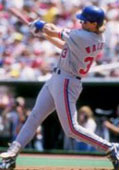What Might Have Been
In 1969, the Montreal Expos became the first non-NHL major league team awarded to a Canadian city. The team played in Jarry Park, a 28,000 seat makeshift stadium, until Olympic Stadium was ready in 1977. New Orleanian Rusty Staub was in the opening day lineup in RF. After 10 straight losing seasons, the team went 95-65 in 1979 under Dick Williams. They reached the postseason for the first and only time at the end of the split season of 1981. They defeated the Phillies 3 games to 2 but lost to the Dodgers in the NLCS on a cold Monday afternoon on a ninth-inning homer by Rick Monday. The game is known forever as "Blue Monday."
The landmark season of the Expos was 1994. Under manager Felipe Alou, the team had the best record in baseball (74-40) on August 11. They led the Atlanta Braves, three-time defending NL East champions, by six games. Since over one million had already passed through the turnstiles, the club was certain to set a Montreal attendance record.
The team was no fluke, as an examination of the roster shows.
Starting
pitchers |
Relievers Gil Heredia Mel Rojas Jeff Shaw John Wetteland (closer) |
Basic
eight starters: C Darrin Fletcher 1B Cliff Floyd 2B Mike Lansing SS Wil Cordero 3B Sean Berry LF Moises Alou CF Marquis Grissom RF Larry Walker |
 |
Many rated the outfield the best in baseball. The highest paid players were Walker ($4M), Grissom ($3.5M), Hill ($2.6M), and Wetteland ($2.2). 21-year-old Pedro Martinez made $200,000. This was certainly Montreal's best chance to reach the World Series.
Alas, it was not to be. A players' strike shut down the season on August 12. When negotiations dragged into September with no hope of a settlement, acting Commissioner Bud Selig cancelled the rest of the season – the first time since 1904 that the World Series was not played.
The loss of a season of such promise started a chain of events that led to baseball abandoning Montreal after the 2004 season. The strike hurt the team's drive for a desperately needed new stadium. For 1995, owner Claude Brochu instructed general manager Kevin Malone to let the contracts of the team's stars expire. Many of those players subsequently said they would have been willing to make less than they could have gotten elsewhere in order to keep the team together, although that's easy to say when the question is theoretical. Not surprisingly, performance dropped considerably, although the franchise continued to develop young talent that would jump to other clubs as soon as they became free agents.
Jeff Loria bought the team in 1999 but lost any remaining good will from the fans with stupid free agent acquisitions (Graeme Lloyd, Hideki Irabu, and Lee Stevens among others) and moves such as taking the team off TV and English radio for the 2000 season. By 2001, attendance dropped to less than 10,000 per contest.
In February 2002, baseball tried to eliminate the franchise along with the Minnesota Twins. However, when legal challenges stopped the Twins' execution, baseball was stuck with the Expos. For the 2002-4 seasons, major league baseball ran the club. The team played some home games in Puerto Rico in 2003 and 2004. Finally, a new home was found in Washington D.C., where the club became the Nationals.